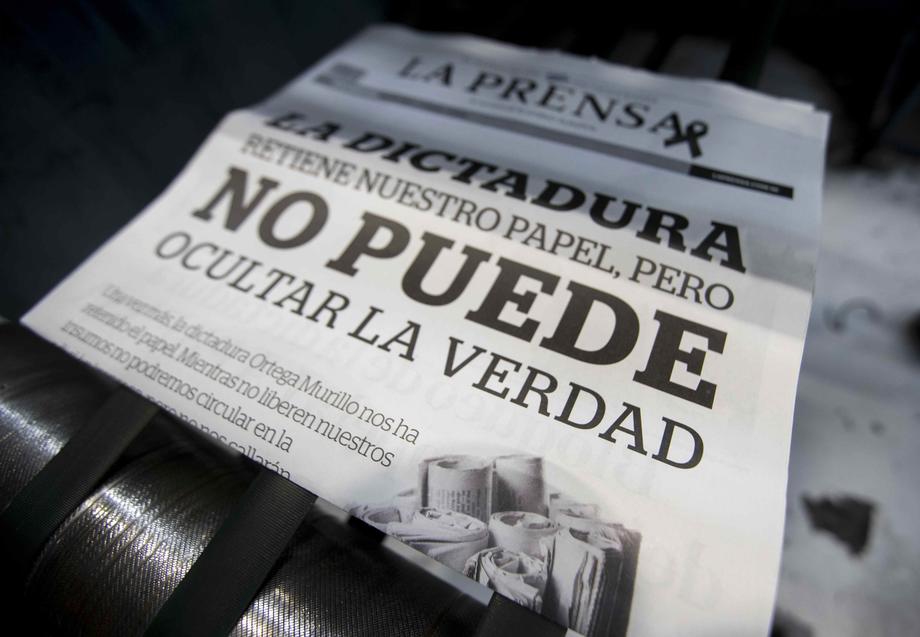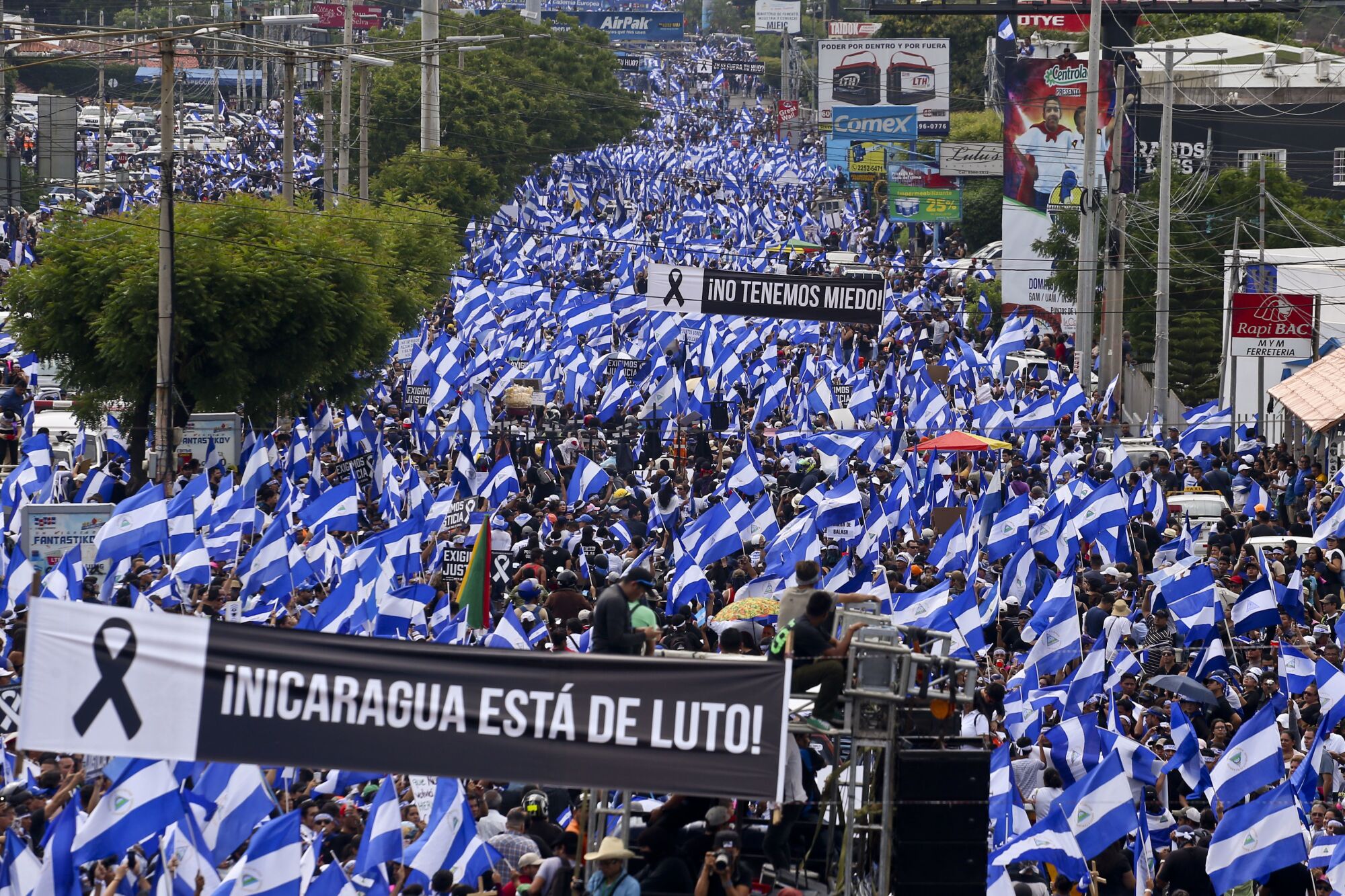November 4, 2022
Nicaragua: A Sanctioned Country

On May 30, 2018 the people of Nicaragua walked the streets of Managua with one purpose: to honor the victims of the recent riots and the mothers who had lost them, not in vain but in the name of their country. Almost 500,000 people grabbed their blue and white flags and flooded the streets. Everyone’s head hung low as memories of the past month filled their heads. In the last month, Nicaragua had turned into a landscape of civil war with no borders and no mercy. It was all due to the brutality of the police and the scheming brains behind them, the government. On Mother’s Day, the peaceful protestors decided to march in honour of those who could not be there anymore. Everybody joined in what seemed like a wave of blue and white. However, nobody thought this day of mourning would also turn bloody, as snipers and police intersected the protest. .1

On this day, 16 died, increasing the number confirmed in reports of more than 100 killed since the beginning of April 2018. The Episcopal Conference of Catholic Bishops had been mediating between government officials and the protestors, and after witnessing the Mother’s Day massacre, they cancelled the dialogue that was scheduled for the next day. Accusations failed after the government denied any involvement with the violence that occurred since the protests had started. Sadly, not even a day of mourning could stop the brutality of the government..2
La Prensa, one of Central America’s historically most vulnerable and resilient newspapers, has been and is a constant victim of the government’s grip. However, the suffering La Prensa and its staff endures does not come without a precedent. In 1978, an editor and publisher of La Prensa, Pedro Joaquin Chamorro was shot to death. He had been suspended of his civil rights and his paper had been under government censorship. Even though his death has never publicly been blamed on the government, it is widely recognized as such. 3

In 2018, the paper was once again a target for speaking out against the government. The government denied them access to their newsprint and ink by blocking passage of these materials at the border. During the course of a year, La Prensa was forced to let go of various employees, shrink from 38 pages to eight, and use locally found paper which was more expensive. In January of 2019, they decided to run the front page of the paper completely empty except for the words: “Have you imagined living without information?” These words were a direct protest of the government’s hold of their main resource, their newsprint paper. The president of the newspaper, Jaime Chamorro, received no explanation for the suppression and release of their materials. However, after the release, Chamorro stated: “I think it benefitted [the government] too, not just us, because imagine it, if La Prensa had been closed down, we would have been the first country in the world without a print newspaper.” ”4
/cdn.vox-cdn.com/uploads/chorus_image/image/66342062/1085681964.jpg.0.jpg)
In August 2021, days after the director of La Prensa, Jaime Chamorro, passed away, the police stormed into headquarters and took control of everything in their path. As soon as they entered, they sealed all entrances, cut off access to the internet and power and even demanded all workers turn off their phones. Minutes after this, they declared they had issued an investigation against the newspaper and the board for custom fraud and money laundering. Two hours later, five patrol cars finally retired from the premises, but they were not empty handed. The publisher of the paper, Juan Lorenzo Holmann was taken under false pretences. 5For Holmann, it has now been a year of imprisonment, wrongful convictions and poor treatment. This year, the large letters with the name of the newspaper were taken down, to much despair for Nicaraguans everywhere. The president and his wife had schemed to take control over the property as it was “duly registered in favor of the State.” They announced it was being replaced by a “cultural and polytechnic center.” The staff that remained were faced with the decision to either stay and possibly be detained or flee their country. La Prensa now reports online, most board members and staff of the newspapers now work from all over the globe, still speaking out against the harsh government conditions that invade their country.6

In addition to the loss in 1978, an editor and publisher of La Prensa, Pedro Joaquin Chamorro, many other journalists and artists have been victims of the government’s terrorism as well.
One of them was Carlos Mejia Godoy, a famous Nicaraguan singer and poet. Back in the 70’s and 80’s he was a supporter of the Sandinistas and even wrote popular anthems for them. However, he parted ways after Ortega’s reelection in 2006. A decade later during the crisis, his voice rose again through a letter to the president where he demanded he stop the killings. He also composed new songs regarding the rising of the people and a new revolution.7During an interview in 2020, the singer claimed: “I continue to demand that the Government cease using my songs as a chorus for crime, terror and genocide.” Now, Mejia finds himself exiled in Costa Rica due to fear of being prosecuted. However, he is not alone but surrounded by many other journalists, artists and Nicaraguans running from their government.8
Two years after the beginning of the crisis, President Ortega applied a set of laws that would cripple freedom of rights to nothing in Nicaragua. The first one is called a “hate speech law” and was introduced by the vice president, Rosario Murillo. This law, according to her, would target “inhuman, humiliating hate crimes.” The “gag law” which is a cybercrime bill is for individuals who use social media or technology to spread false information, information that will cause fear, promote violence or endanger national security. The Nicaraguan government was also considering passing a law similar to one passed in Russia in 2012: the “foreign agents” bill targets people or companies that receive money from other countries. This includes NGOs, journalists and artists. These bills and laws are basically a coverup and excuse for the government to continue their prosecution of individuals exercising their rights.9
The government in Nicaragua ultimately controls every aspect of media and press which puts journalists and artists at risk. Even though the general public continues to fight for their freedom, it can be discouraging to see a lack of change. Nicaragua’s government is just one of the few in the world that targets the people’s freedom of speech. If governments around the world continue to shut down the media and press, future generations will have to speak up even louder to keep their freedom of speech.
- (www.dw.com), Deutsche Welle. “Nicaragua Death Toll Rises after Mothers’ Day Protests.” DW Learn German. Accessed October 11, 2022. https://learngerman.dw.com/en/nicaragua-death-toll-rises-after-mothers-day-protests/a-44028455. ↵
- Rivas, Oswaldo. “Fifteen Killed in Nicaragua Protests, Including Mother’s Day March Attack.” Reuters. Thomson Reuters, May 31, 2018. https://www.reuters.com/article/us-nicaragua-protests/fifteen-killed-in-nicaragua-protests-including-mothers-day-march-attack-idUSKCN1IW27E. ↵
- “To Silence a Newspaper, Nicaragua’s Government Took Away Its Paper and Ink.” Los Angeles Times. Los Angeles Times, February 21, 2020. https://www.latimes.com/world-nation/story/2020-02-21/nicaragua-newspaper-president-ortega-la-prensa#:~:text=But%20a%20few%20years%20later,the%20presidential%20election%20in%201990. ↵
- Houck, Caroline, and CD Goette-Luciak. “Burnt Radio Stations and 18-Month Newsprint Blockades: Inside the Slow Culling of Nicaragua’s Free Press.” Vox. Vox, February 20, 2020. https://www.vox.com/2020/2/20/21131451/nicaragua-la-prensa-press-freedom. ↵
- “Staff of La Prensa, Nicaragua’s Leading Independent Newspaper, Forced to Flee Abroad.” RSF. Accessed November 1, 2022. https://rsf.org/en/staff-la-prensa-nicaragua-s-leading-independent-newspaper-forced-flee-abroad. ↵
- Bonnet, Isabel, Aakash Hassan, Liam Scott, and Erica Hellerstein. “In Nicaragua, There Are No More Newspapers.” Coda Story, September 15, 2022. https://www.codastory.com/disinformation/nicaragua-war-on-media/. ↵
- “’My Life Was in Danger’: Much-Loved Nicaraguan Singer and Ortega Critic Forced to Flee.” The Guardian. Guardian News and Media, August 4, 2018.https://www.theguardian.com/world/2018/aug/04/nicaragua-musician-carlos-mejia-godoy-flee. ↵
- Robinson, Circles. “Carlos Mejia Godoy: ‘My Silence Amounted to Complicity.’” Havana Times, May 1, 2020. https://havanatimes.org/interviews/carlos-mejia-godoy-my-silence-amounted-to-complicity/. ↵
- Viveros-Fauné, Christian. “Nicaraguan Government Moves to Tighten Its Grip on Free Expression.” The Art Newspaper – International art news and events. The Art Newspaper – International art news and events, September 28, 2021. https://www.theartnewspaper.com/2020/10/14/nicaraguan-government-moves-to-tighten-its-grip-on-free-expression. ↵
Tags from the story

Mariana Chamorro
My name is Mariana Chamorro, I am from Managua, Nicaragua and I’m a junior majoring in Communication Studies and minoring in Visual Design Communications and Psychology.
Author Portfolio PageRecent Comments
Amanda Uribe
Congrats on your nomination! I loved how your article educates about the current sensorship happening in Nicaragua. Sadly, these things are hardly talked about when it is actually happening! It makes me so sad to hear that the news papers are practicially empty. Sensorship like this makes all forms of art and expression disappear. I hope the people of Nicaragua are able to regain their civil rights.
27/11/2022
9:10 am
Nicole Estrada
Congratulations on your nomination! I thought this topic was very interesting and I am glad you decided to write about an issue that is not talked about as much as it should be. I believe this issue should be talked about more because it involves our international relations with a country we the United States is allies with. This article not only discusses that we stand and advocate for freedom of speech and democracy but discusses the clear issue that Nicaragua has. I really enjoyed the images you used, I believe it brought the article together and brought great imagery. Again, Congratulations on your nomination! Fantastic article!
27/11/2022
9:10 am
Sarah Guerrero
Great job on this article, Mariana! You could tell that you are passionate about this subject, and with good reason! This issue is something that more people need to know about. It is so sad to hear the strife that Nicaragua and other Latin American countries suffer because of harsh rulers and governmental leaders. Reading this made me all the more grateful that we have freedom of speech in the United States, but also a desire to take a stand since the Nicaraguan government hasn’t listened to its people yet.
29/11/2022
9:10 am
Alejandra Pardo
Great job, such a well-articulated article with plenty of information for the reader. These issues are hardly spoken of in-depth and reading this article gives insight of what people of Nicaraguan deal with on a daily basis. Thank you for providing images of the rally they do a great job showing how many people in Nicaragua show up.
22/01/2023
9:10 am
Amy Hotema
Mariana did a great job on her article! You were able to convey your enthusiasm for the topic, and with good cause! There is a need for more individuals to be aware of this problem. Hearing about the conflict that Nicaragua and other Latin American nations experience due to oppressive dictators and political figures makes me very sad. Reading this made me even more appreciative of the freedom of expression we enjoy in the United States and inspired me to take a position because the Nicaraguan government hasn’t yet heeded the calls of its citizens.
28/04/2023
9:10 am
Olivia Flores
Congrats on your nomination as this is such a great article. It is so sad to see what happened in Nicaragua and it honestly just makes you think how grateful we are to be living in a society where our government doesn’t suppress us in this way. It is important for us to be educated on a topic such as this because I had never known about the government being so harsh and so many people being killed. You did such a great job on your article keep it up!
09/05/2023
9:10 am
Juan Aguirre Ramirez
This article was really captivating Mariana! The use of images kept me interested throughout, and I learned something new that I had never heard of before. It’s great to have access to so much information through these kinds of articles. I was shocked to learn about some of the events that happened in Nicaragua, and I appreciate that this topic was brought to light. Congratulations on your nomination, well deserved! It’s important to discuss issues outside of the United States, especially when it concerns our allies and advocating for democracy and freedom of speech.
11/05/2023
9:10 am
Alexis Zepeda
Hello! Congratulations on your nomination and publishing a great article! I love that this article gives an immense amount of insight to what the government in Nicaragua is like. It is articles such as this one that brings awareness to current events in countries many people may not be familiar with. In bringing this awareness to people, a change can begin taking its first steps. Great job!
12/05/2023
9:10 am
Sebastian Hernandez-Soihit
Great work! This does a good job in highlighting the devastating effects of economic sanctions on the people of Nicaragua. Very clear view and analysis of the political and economic factors at play. Both informative and thought-provoking.
12/05/2023
9:10 am
Jose Luis Gamez, III
The article points out that freedom of speech is not a fundamental right to other countries. The people of Nicaragua are kept in the dark about the truth of their local, national, and global events. It is interesting that such a basic right can be such a basic necessity especially in a country whose government may be withholding valuable information for their progress. It is great to know, however, that younger generations will carry the responsibility to make their voices be known.
27/11/2022
9:10 am